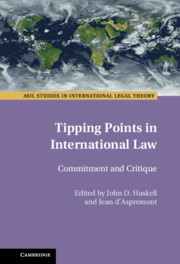Book contents
- Tipping Points in International Law
- ASIL Studies in International Legal Theory
- Tipping Points in International Law
- Copyright page
- Contents
- Contributors
- Acknowledgments
- 1 Experiencing Tipping Points in International Law
- 2 The Literary Performances of the Tipping Point
- 3 Authoritarianism
- 4 China
- 5 Democracy
- 6 Development
- 7 Digital
- 8 Environment
- 9 Health
- 10 Human Rights
- 11 Labor
- 12 Liberation
- 13 Multilateralism
- 14 Race
- 15 Religion
- 16 Rule of Law
- 17 Russia
- 18 Systems
- 19 Territory
- 20 United Nations
- 21 Universalism
- Index
17 - Russia
Published online by Cambridge University Press: 23 October 2021
- Tipping Points in International Law
- ASIL Studies in International Legal Theory
- Tipping Points in International Law
- Copyright page
- Contents
- Contributors
- Acknowledgments
- 1 Experiencing Tipping Points in International Law
- 2 The Literary Performances of the Tipping Point
- 3 Authoritarianism
- 4 China
- 5 Democracy
- 6 Development
- 7 Digital
- 8 Environment
- 9 Health
- 10 Human Rights
- 11 Labor
- 12 Liberation
- 13 Multilateralism
- 14 Race
- 15 Religion
- 16 Rule of Law
- 17 Russia
- 18 Systems
- 19 Territory
- 20 United Nations
- 21 Universalism
- Index
Summary
Who really gets to decide sovereignty claims? Who assumes state sovereignty and who has the right and power to abrogate or limit the said sovereignty rights? Who is the collective “we” in Haskell’s framing that is practicing law-faith: “belief in the rule of law as a neutral process of adjudication [of sovereignty questions]?” Is “we” just a form of “surreptitious conscription,” a politically loaded “attempt to smuggle tribalism through customs?”
- Type
- Chapter
- Information
- Tipping Points in International LawCommitment and Critique, pp. 293 - 320Publisher: Cambridge University PressPrint publication year: 2021

